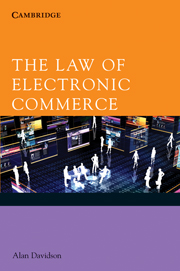Book contents
- Frontmatter
- Contents
- Acknowledgements
- Table of Cases
- Table of statutes
- 1 The law of electronic commerce
- 2 The rule of cyberspace
- 3 Electronic commerce and the law of contract
- 4 Shrinkwrap, clickwrap and browsewrap contracts
- 5 Electronic signatures
- 6 Copyright issues in electronic commerce
- 7 Electronic commerce – trade marks, patents and circuit layouts
- 8 Domain names
- 9 Domain name disputes
- 10 Uniform domain name dispute resolution policies
- 11 Jurisdiction in cyberspace
- 12 Defamation in cyberspace
- 13 Privacy and data protection in cyberspace
- 14 Electronic mail and online presence
- 15 National electronic surveillance
- 16 Cybercrime
- 17 Evidence of electronic records
- 18 Censorship – Broadcast and online content regulation
- 19 An international perspective
- Appendix A Electronic Transactions (Victoria) Act 2000
- Appendix B UNCITRAL Model Law on Electronic Commerce
- Appendix C Selected provisions Copyright Act 1968 (Cth)
- Appendix D ICANN Uniform Dispute Resolution Policy (UDRP)
- Appendix E .au Dispute Resolution Policy (auDRP)
- Appendix F National Privacy Principles
- Index
- References
11 - Jurisdiction in cyberspace
Published online by Cambridge University Press: 05 June 2012
- Frontmatter
- Contents
- Acknowledgements
- Table of Cases
- Table of statutes
- 1 The law of electronic commerce
- 2 The rule of cyberspace
- 3 Electronic commerce and the law of contract
- 4 Shrinkwrap, clickwrap and browsewrap contracts
- 5 Electronic signatures
- 6 Copyright issues in electronic commerce
- 7 Electronic commerce – trade marks, patents and circuit layouts
- 8 Domain names
- 9 Domain name disputes
- 10 Uniform domain name dispute resolution policies
- 11 Jurisdiction in cyberspace
- 12 Defamation in cyberspace
- 13 Privacy and data protection in cyberspace
- 14 Electronic mail and online presence
- 15 National electronic surveillance
- 16 Cybercrime
- 17 Evidence of electronic records
- 18 Censorship – Broadcast and online content regulation
- 19 An international perspective
- Appendix A Electronic Transactions (Victoria) Act 2000
- Appendix B UNCITRAL Model Law on Electronic Commerce
- Appendix C Selected provisions Copyright Act 1968 (Cth)
- Appendix D ICANN Uniform Dispute Resolution Policy (UDRP)
- Appendix E .au Dispute Resolution Policy (auDRP)
- Appendix F National Privacy Principles
- Index
- References
Summary
When a radically new situation is presented to the law it is sometimes necessary to think outside the square … this involves a reflection upon the features of the Internet that are said to require a new and distinctive legal approach.
Cyberspace is an illusion. There is no such place. Many terrestrial norms do not and cannot apply to such a fictitious construct. Nevertheless cyberspace users perceive metaphorical chat rooms, folders, files, shops, libraries and so forth. They live digital lives with digital personas in ‘places’ such as Second Life and Facebook. The reality is that each step of the digital experience is rooted terrestrially. Traditional legal principles are applicable to the majority of electronic commerce disputes. Nevertheless, the operation of electronic commerce in cyberspace results in new circumstances to which legal jurists cannot readily apply established legal rules.
The borderless nature of the internet often hides or disguises the origin of particular websites and corresponding information. Questions sometimes arise as to the country or state whose courts have jurisdiction to adjudicate on a matter, and as to which law is to be applied. Courts also have to determine issues such as where conduct occurs – at the computer, the server, the place of business or residence or somewhere else? – and thus which time zone applies. This area of law is referred to as conflict of laws or private international law, and its principles are well established.
- Type
- Chapter
- Information
- The Law of Electronic Commerce , pp. 183 - 203Publisher: Cambridge University PressPrint publication year: 2009

